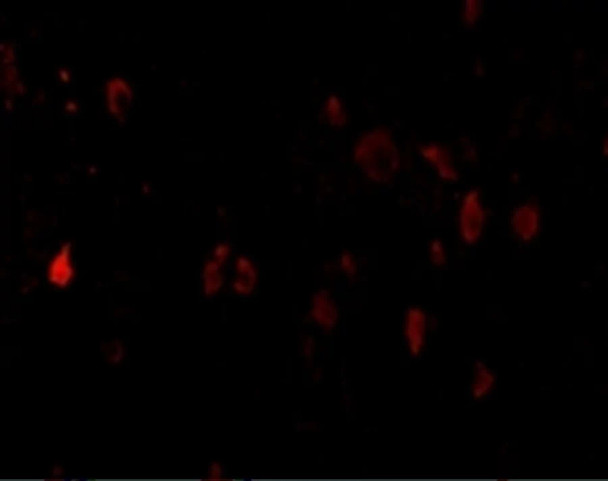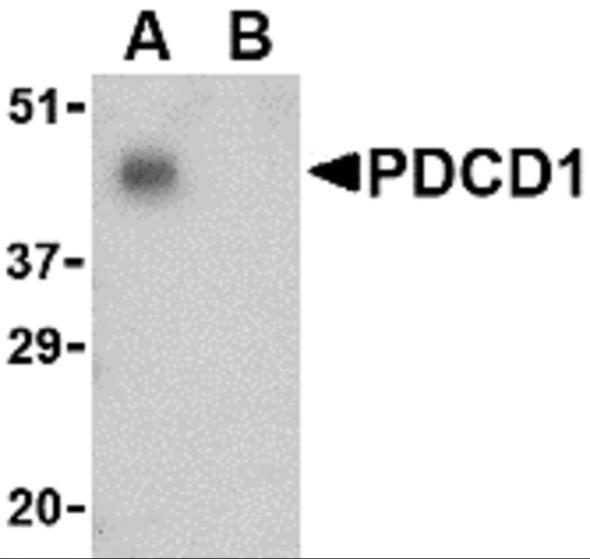Description
PD-L2 Antibody | 4063 | ProSci
Host: Rabbit
Reactivity: Human, Mouse
Homology: Predicted species reactivity based on immunogen sequence: rat (94%) .
Immunogen: Anti-PD-L2 antibody (4063) was raised against a peptide corresponding to 16 amino acids near the center of human PD-L2.
The immunogen is located within amino acids 140-190 of PD-L2.
Research Area: Apoptosis
Tested Application: E, WB, IHC-P, IF
Application: WB: 0.5-4 μg/mL; IHC: 2.5 μg/mL; IF: 20 μg/mL.
Antibody validated: Western Blot in human and mouse samples; Immunohistochemistry in mouse samples; Immunofluorescence in mouse samples. All other applications and species not yet tested.
Specificiy: N/A
Positive Control 1: Cat. No. 1207 - Raji Cell Lysate
Positive Control 2: Cat. No. 1403 - Mouse Brain Tissue Lysate
Positive Control 3: Cat. No. 1201 - HeLa Cell Lysate
Positive Control 4: Cat. No. 1224 - Daudi Cell Lysate
Positive Control 5: Cat. No. 1282 - 3T3/NIH Cell Lysate
Positive Control 6: N/A
Molecular Weight: Predicted: 31kD
Observed: 29 kD
Validation:
Independent Antibody Validation in Cell lines (Figure 2) shows similar PD-L2 expression profile in human and mouse cell lines detected by two independent anti-PD-L2 antibodies that recognize different epitopes, 4063 against central domain and the competitor antibody against N-terminus domain. PD-L2 proteins are detected in the most tested cell lines at different expression levels by the two independent antibodies.
KO Validation (Figure 3) : Anti-PD-L2 antibodies (4063) specificity was further verified by PD-L2 specific knockout. PD-L2 signal was not detected in PD-L2 knockout HeLa cells as compared to that in control wild type cells.
Recombinant Protein Test (Figure 4) : Anti-PD-L2 antibodies (4063) detected human PD-L2 recombinant protein at different concentrations.
Regulated expression validation (Figure 11) : PD-L2 expression detected by anit-PD-L2 antibodies (4063) was up-regulated by anti-PD1 antibody treatment, which was reduced by Next A alone or combination treatment (anti-PD1 antibody + NextA) .
Isoform: Human PD-L2 has 3 isoforms, including isoform 1 (273aa, 31kD) , isoform 2 (183aa, 21kD) and isoform 3 (182aa, 21kD) . Mouse PD-L2 has one isoform (247aa, 28kD) and Rat PD-L2 also has one isoform (268aa, 30kD) . 4063 can detect human isoform and mouse isoform.
Purification: PD-L2 Antibody is affinity chromatography purified via peptide column.
Clonality: Polyclonal
Clone: N/A
Isotype: IgG
Conjugate: Unconjugated
Physical State: Liquid
Buffer: PD-L2 Antibody is supplied in PBS containing 0.02% sodium azide.
Concentration: 1 mg/mL
Storage Condition: PD-L2 antibody can be stored at 4˚C for three months and -20˚C, stable for up to one year. As with all antibodies care should be taken to avoid repeated freeze thaw cycles. Antibodies should not be exposed to prolonged high temperatures.
Alternate Name: PD-L2 Antibody: B7DC, Btdc, PDL2, CD273, PD-L2, PDCD1L2, bA574F11.2, B7DC, Programmed cell death 1 ligand 2, Butyrophilin B7-DC, PD-1 ligand 2
User Note: Optimal dilutions for each application to be determined by the researcher.
BACKGROUND: PD-L2 Antibody: Cell-mediated immune responses are initiated by T lymphocytes that are themselves stimulated by co gnate peptides bound to MHC molecules on antigen-presenting cells (APC) . T-cell activation is generally self-limited as activated T cells express receptors such as PD-1 (also known as PDCD-1) that mediate inhibitory signals from the APC. PD-1 can bind two different but related ligands, PD-L1 and PD-L2, both of which are thought act as a negative regulator of T cell activation. However, it has been suggested that PD-L2 can act to stimulate an immunogenic response through and alternative receptor from PD-1.
Additional Information
Clonality: |
Polyclonal |
Tested Applications: |
E, IF, IHC-P, WB |
Host Species: |
Rabbit |
Species Reactivity: |
Human, Mouse |
Conjugate: |
Unconjugated |


































![PD-1 Antibody [7A11B1] PD-1 Antibody [7A11B1]](https://cdn11.bigcommerce.com/s-d51n6vkyg9/images/stencil/590x590/products/13867/22002/lighter__57672.1653931334.jpg?c=1)
![PD-1 Antibody [7A11B1] PD-1 Antibody [7A11B1]](https://cdn11.bigcommerce.com/s-d51n6vkyg9/images/stencil/590x590/products/13867/20027/PD-1-Antibody-7A11B1_IHC_PM-5177__10180.1650069837.jpg?c=1)



